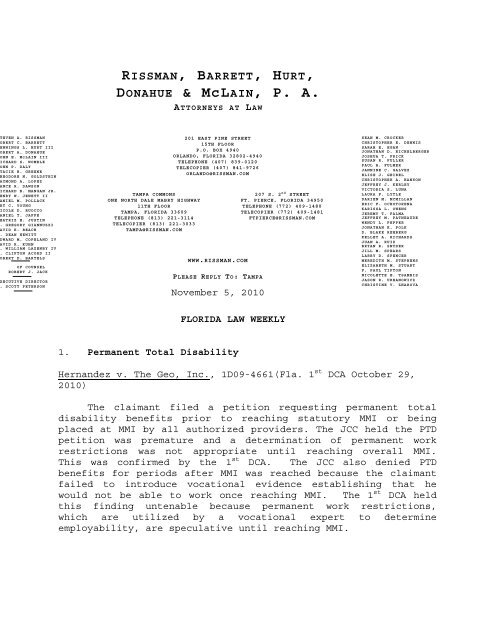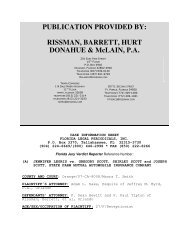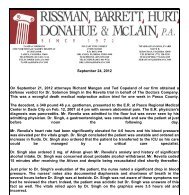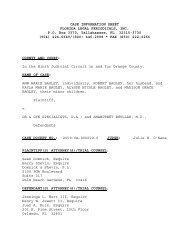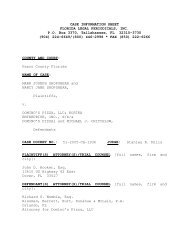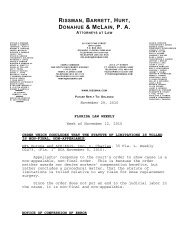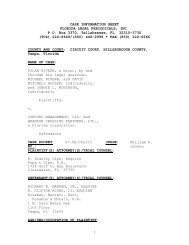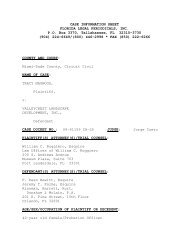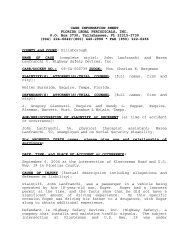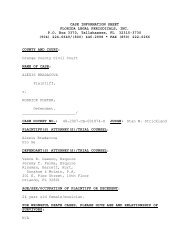Florida Law Weekly - Rissman, Barrett, Hurt, Donahue & McLain, PA
Florida Law Weekly - Rissman, Barrett, Hurt, Donahue & McLain, PA
Florida Law Weekly - Rissman, Barrett, Hurt, Donahue & McLain, PA
Create successful ePaper yourself
Turn your PDF publications into a flip-book with our unique Google optimized e-Paper software.
RISSMAN, BARRETT, HURT,<br />
DONAHUE & McLAIN, P. A.<br />
ATTORNEYS AT LAW<br />
EVEN A. RISSMAN<br />
BERT C. BARRETT<br />
NNINGS L. HURT III<br />
BERT A. DONAHUE<br />
HN E. McLAIN III<br />
CHARD S. WOMBLE<br />
HN P. DALY<br />
ACIE B. GREENE<br />
EODORE N. GOLDSTEIN<br />
YMOND A. LOPEZ<br />
NCE R. DAWSON<br />
CHARD B. MANGAN JR.<br />
NRY W. JEWETT II<br />
NIEL M. POLLACK<br />
T C. YOUNG<br />
COLE D. RUOCCO<br />
NIEL T. JAFFE<br />
ATRIZ E. JUSTIN<br />
GREGORY GIANNUZZI<br />
VID K. BEACH<br />
DEAN HEWITT<br />
WARD M. COPELAND IV<br />
VID R. KUHN<br />
WILLIAM LAZENBY IV<br />
CLIFTON ACORD II<br />
BERT D. BARTELS<br />
OF COUNSEL<br />
ROBERT J. JACK<br />
ECUTIVE DIRECTOR<br />
SCOTT PETERSON<br />
TAM<strong>PA</strong> COMMONS<br />
ONE NORTH DALE MABRY HIGHWAY<br />
11TH FLOOR<br />
TAM<strong>PA</strong>, FLORIDA 33609<br />
TELEPHONE (813) 221-3114<br />
TELECOPIER (813) 221-3033<br />
TAM<strong>PA</strong>@RISSMAN.COM<br />
201 EAST PINE STREET<br />
15TH FLOOR<br />
P.O. BOX 4940<br />
ORLANDO, FLORIDA 32802-4940<br />
TELEPHONE (407) 839-0120<br />
TELECOPIER (407) 841-9726<br />
ORLANDO@RISSMAN.COM<br />
WWW.RISSMAN.COM<br />
PLEASE REPLY TO: TAM<strong>PA</strong><br />
November 5, 2010<br />
207 S. 2 nd STREET<br />
FT. PIERCE, FLORIDA 34950<br />
TELEPHONE (772) 409-1480<br />
TELECOPIER (772) 409-1481<br />
FTPIERCE@RISSMAN.COM<br />
SEAN M. CROCKER<br />
CHRISTOPHER E. DENNIS<br />
SARAH E. EGAN<br />
JONATHAN D. EICHELBERGER<br />
JOSHUA T. FRICK<br />
SUSAN R. FULLER<br />
<strong>PA</strong>UL B. FULMER<br />
JANNINE C. GALVEZ<br />
ELISE J. GEIBEL<br />
CHRISTOPHER A. HANSON<br />
JEFFREY J. KERLEY<br />
VICTORIA S. LUNA<br />
LAURA F. LYTLE<br />
DARIEN M. MCMILLAN<br />
ERIC F. OCHOTORENA<br />
KARISSA L. OWENS<br />
JEREMY T. <strong>PA</strong>LMA<br />
JEFFREY M. <strong>PA</strong>TNEAUDE<br />
WENDY L. PEPPER<br />
JONATHAN K. POLK<br />
D. BLAKE REHBERG<br />
KELLEY A. RICHARDS<br />
JUAN A. RUIZ<br />
BRYAN R. SNYDER<br />
JILL M. SPEARS<br />
LARRY D. SPENCER<br />
MEREDITH M. STEPHENS<br />
ELIZABETH M. STUART<br />
F. <strong>PA</strong>UL TIPTON<br />
NICOLETTE E. TSAMBIS<br />
JASON R. URBANOWICZ<br />
CHRISTINE V. ZHAROVA<br />
FLORIDA LAW WEEKLY<br />
1. Permanent Total Disability<br />
Hernandez v. The Geo, Inc., 1D09-4661(Fla. 1 st DCA October 29,<br />
2010)<br />
The claimant filed a petition requesting permanent total<br />
disability benefits prior to reaching statutory MMI or being<br />
placed at MMI by all authorized providers. The JCC held the PTD<br />
petition was premature and a determination of permanent work<br />
restrictions was not appropriate until reaching overall MMI.<br />
This was confirmed by the 1 st DCA. The JCC also denied PTD<br />
benefits for periods after MMI was reached because the claimant<br />
failed to introduce vocational evidence establishing that he<br />
would not be able to work once reaching MMI. The 1 st DCA held<br />
this finding untenable because permanent work restrictions,<br />
which are utilized by a vocational expert to determine<br />
employability, are speculative until reaching MMI.
2. Evidence<br />
Locker v. United Pharmaceutical Group, Inc., 1D10-0464 (Fla. 1 st<br />
DCA October 29, 2010).<br />
The claimant filed a PFB requesting authorization of<br />
continued treatment for her right shoulder and attached a note<br />
from an authorized provider detailing the recommended treatment.<br />
On a prior issue, the JCC relied on an EMA who opined the<br />
claimant had returned to baseline and no further treatment is<br />
medically necessary. The E/C filed a Motion to Dismiss the<br />
Petition arguing that since the claimant failed to challenge the<br />
EMA’s prior opinion, she was not entitled to re-litigate the<br />
issue. Thus, the current claims cannot be in “default, ripe,<br />
due, and owing” as required by the statutes. The JCC granted<br />
the Motion relying on the prior EMA’s opinion. The 1 st DCA<br />
reversed and held that a JCC must not look outside the four<br />
corners of the Petition when ruling on a Motion to Dismiss.<br />
3. Settlement<br />
Cordovez v. High Rise Installation, Inc., 1D09-5786 (Fla. 1 st<br />
October 29, 2010).<br />
DCA<br />
The claimant sought reversal of the JCC’s denial of his<br />
Motion to Vacate settlement. He argued that a new condition<br />
presented after settlement that neither party knew about and,<br />
thus, the settlement should be vacated based on a mutual mistake<br />
of fact. The E/C cited settlement language releasing themselves<br />
of all future benefits related to the work accident. In a<br />
follow-up deposition, the authorized provider opined the unknown<br />
injury was likely caused by the work accident. The 1 st DCA<br />
upheld the JCC’s denial of the Motion by reasoning that the time<br />
to ascertain the full implications of the claimant’s injury is<br />
prior to settlement.<br />
4. Medical Benefits<br />
Harman v. Gadsden Correctional Facility, 1D10-1227 (Fla. 1 st<br />
October 29, 2010).<br />
DCA<br />
The claimant alleged an injury to her knee. The accident<br />
was accepted as compensable and medical treatment was<br />
authorized. The initial authorized provider could not find an<br />
objective basis for the claimant’s subjective complaints and,<br />
rather than placing at MMI, the provider referred the claimant<br />
for a second evaluation to determine if there are any objective
findings. The E/C denied the request and the JCC agreed with<br />
its reasoning that section 440.09(1) requires objective findings<br />
for continued medical treatment. The 1 st DCA reversed and<br />
determined that the JCC’s reliance on 440.09(1) was improper.<br />
In making a determination of authorizing future medical<br />
treatment, the JCC should have relied on section 440.13(2) (a)<br />
and its test of whether the requested benefit is medically<br />
necessary. The only doctor who addressed the issue testified<br />
that the evaluation was medically necessary. The case was<br />
remanded back to the JCC who then determined the referral was<br />
improper as it is considered a transfer of care. The 1 st DCA<br />
again reversed, relying on Morrow v. Sam’s Club, and held that<br />
an evaluation is compensable even if it is to determine whether<br />
there was an objective basis for the claimant’s symptoms.<br />
5. Attorney Fees and Costs<br />
Hack v. Chuck Norris Drywall, 1D10-2041 (Fla. 1 st DCA October 29,<br />
2010)<br />
The parties reached settlement and the JCC approved the<br />
settlement. Claimant’s counsel filed a petition requesting<br />
attorney fees and costs. The JCC determined she did not have<br />
jurisdiction over attorney fees and costs since she already<br />
approved the settlement. The 1 st DCA held that entry of an order<br />
approving a settlement agreement does not, as a matter of law,<br />
extinguish the JCC’s jurisdiction over ancillary liens or claims<br />
for attorney fees and costs.<br />
6. Appeal Venue<br />
B.F. v. AMS Staff Leasing and Aspen Administrators, 1D10-2688<br />
(Fla. 1 st DCA October 29, 2010)<br />
The claimant filed a Motion to transfer venue of his<br />
workers’ compensation appeal to the 3 rd DCA. The 1 st DCA denied<br />
the Motion and cited section 440.271, which states “review of an<br />
order of a [JCC] entered pursuant to chapter [440] shall be by<br />
appeal to the 1 st DCA.” The 1 st DCA reasoned the statute proper<br />
because the state divisions that administer workers’<br />
compensation are headquartered in Tallahassee.
7. JCC decision review<br />
KFC/Yum! Brands v. Benjamin Moore, 1D10-0599 (Fla. 1 st<br />
October 29, 2010)<br />
DCA<br />
At Final Hearing, the JCC accepted the opinion of the<br />
claimant’s long time treating physician over that of the E/C’s<br />
IME. On appeal, the E/C pointed out inconsistencies in the<br />
treating physician’s opinion and the claimant’s medical history.<br />
The E/C argued the JCC should have accepted the IME opinions<br />
over that of the authorized provider. The 1 st DCA held that the<br />
JCC’s decision was backed by competent substantial evidence.<br />
The 1 st DCA found the provider’s testimony, when taken as a<br />
whole, is neither unreasonable nor illogical, and has a legally<br />
sufficient foundation.<br />
8. Occupational Diseases<br />
City of Pembroke Pines v. Ortagus, 1D09-6168 (Fla. 1 st<br />
November 2, 2010.<br />
DCA<br />
The claimant is a firefighter and was diagnosed with<br />
hypertension. He was placed on light duty for four days and<br />
then released to return to full duty. Thereafter, his<br />
authorized provider gave him a prescription for medication to<br />
control the hypertension. He requested the E/C pay for the<br />
medication. The E/C denied the request arguing that statute<br />
112.18 only requires the E/C to provide continued medical<br />
treatment when the claimant is totally or partially disabled.<br />
It argued the claimant is no longer totally or partially<br />
disabled because he was released to full duty. The 1 st DCA held<br />
that once compensability is established, nothing in section 440<br />
conditions the receipt of medical benefits on continued<br />
disability.<br />
9. Counsel Disqualification<br />
Matrix Employee Leasing v FWCIGA/First Commercial Claim Services<br />
1D10-3054 (Fla. 1 st DCA November 2, 2010)<br />
The issue is whether the JCC has jurisdiction to rule on a<br />
Motion to Disqualify Counsel. The First DCA held that because<br />
the JCC is empowered to do all things conformable with law<br />
pursuant to Section 440.33 (1), the JCC has jurisdiction to<br />
determine whether rules regulating the <strong>Florida</strong> Bar 4-1.9 and 4-<br />
1.10 require the disqualification of a counsel.


